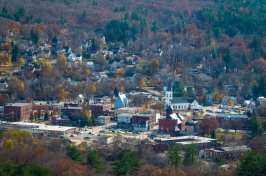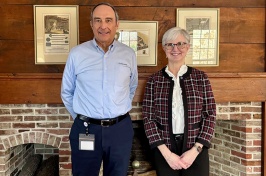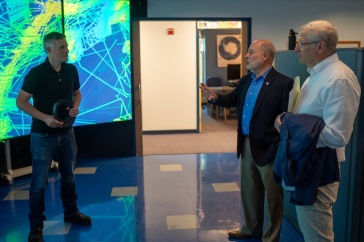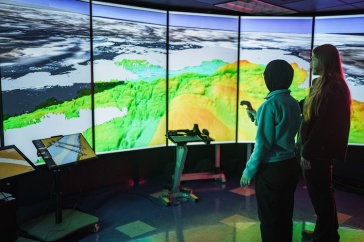Asking for time off on your first day at a new job can be awkward.
 New research professor Jennifer Miksis-Olds received the prestigious Presidential Early Career Award for Scientists and Engineers (PECASE) just days after joining UNH's School of Marine Science and Ocean Engineering.
New research professor Jennifer Miksis-Olds received the prestigious Presidential Early Career Award for Scientists and Engineers (PECASE) just days after joining UNH's School of Marine Science and Ocean Engineering.
But accepting an award from President Obama significantly mitigates that unease, Jennifer Miksis-Olds found recently.
Just days after arriving at UNH’s School of Marine Science and Ocean Engineering (SMSOE) in late April, research professor Miksis-Olds traveled to the White House to collect the prestigious Presidential Early Career Award for Scientists and Engineers (PECASE) from Obama. Miksis-Olds, a marine acoustician, was among just over 100 federally funded scientists and engineers from around the world to receive the honor, which carries $1 million in research funding.
“Jennifer brings a remarkable scientific background and years of experience that combine a deep understanding of marine mammals and underwater acoustics,” says Larry Mayer, director of the SMSOE and the Center for Coastal and Ocean Mapping (CCOM). “The impact of sound on marine mammals is an area of great concern and Jennifer’s expertise will help bring the School of Marine Science and Ocean Engineering to the forefront of research in this area.”
Miksis-Olds joins the SMSOE after nearly a decade at Penn State, where she held appointments in colleges of engineering and agriculture as well as the intercollege ecology program and was the founding director of its Center for Marine Science and Technology.
“I use acoustic technology to study life in the ocean,” she says. Her work has one foot in biology, specifically marine mammal behavior, and the other in using acoustics as a tool for better understanding the ocean and the life within it. It’s a technology that goes far beyond whale songs.
“I use acoustic technology to study life in the ocean.”
“You can learn a lot from listening,” she says. “You can derive wind speed, you can get an idea of the surface conditions — whether it’s rough or ice covered — you can get an idea of the animals in an area by the vocalizations they make.”
Using hydrophones — underwater microphones — as well as sonar and echosounders mounted on moorings, she’s eavesdropped on oceans around the globe. Here at UNH, she’ll continue that research and work with acousticians and ocean mappers in the Center for Coastal and Ocean Mapping to explore the potential effects of sound, particularly the multibeam sonar used in mapping the seafloor, on marine mammals.

“Sound is a big issue for marine life, because a lot of human use of the ocean produces sound,” she says. She notes that UNH has significant expertise in acoustics, naming her Chase Ocean Engineering Lab neighbors Tom Weber, assistant professor of mechanical engineering, and research professor Anthony Lyons.
With a co-appointment to CCOM and SMSOE and an academic “home department” still to be determined, Miksis-Olds is among the first hires of the interdisciplinary SMSOE, most of whose 70-plus faculty have been engaged with marine and ocean engineering research at UNH since before the school’s founding in 2013.
“I’m looking forward to being part of the Marine School as it grows,” she says. “UNH is on an upward trajectory when it comes to marine science. It’s an exciting time to be here.”
-
Written By:
Beth Potier | UNH Marketing | beth.potier@unh.edu | 2-1566

















































